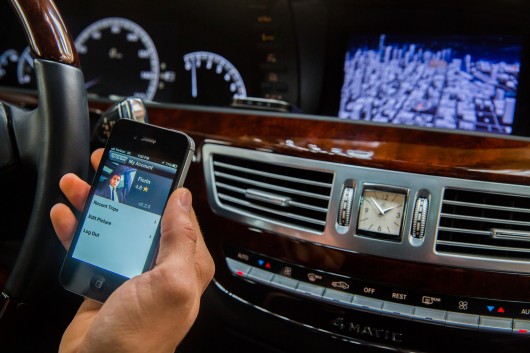
Uber is a car service that officially launched in Columbus Dec. 18. Uber’s smartphone app allows riders to schedule rides from various drivers.
Credit: Courtesy of MCT
Another car service has moved to Columbus, just a few months after a vehicle rental service made a deal to secure spots on Ohio State’s campus. Representatives for the companies, however, said what their businesses offer is meant to serve different needs.
James Ondrey, the general manager of Uber Technologies in Columbus, said it was demand from OSU students that brought Uber, which officially launched in the city Dec. 18, to Columbus.
Uber is a technology company that uses a smartphone app to connect people looking for rides with drivers, Ondrey said, though the company itself owns no cars and employs no drivers.
It was founded in 2009 in San Francisco. Since then, it has expanded to 67 cities around the world, 32 of which are cities in North America, according to its website.
The drivers come from limousine companies using Uber to fill their sedan drivers’ schedules, Ondrey said.
The growth of the company is happening as other car services move to the Columbus area as well, which one competitor said is a good thing for both businesses.
“A rising tide raises all boats,” said Nicholas Hill, location manager of car2go in Columbus.
Car2go is a point-to-point Smart car sharing service, which means users can get in a car at one location and park it later at a different designated spot. CampusParc, which manages and operates the parking facilities on OSU’s campus, signed a renewable annual permit with car2go during Fall Semester, allowing car2go the use of at least 10 different locations on OSU’s campus starting in November.
Hill said while he believes it’s good for people to have transportation options, Uber is more along the lines of a cab than car2go is.
Ondrey agreed. He said while the two services could overlap, they are largely complimentary, with people typically using car2go for longer trips.
On a typical night in Columbus, a ride booked through Uber costs a $6 base fare with an additional 25 cents charged per minute or $2.55 per mile. The minimum fare is $12, according to the Uber website.
Ondrey said, though, on nights when there are more people requesting rides than there are drivers, Uber’s rates can go up.
Car2go, meanwhile, charges rates of $0.38 per minute, $13.99 per hour and $72.99 per day, with a $35 registration charge. Parking, gas, insurance, GPS navigation and vehicle maintenance are all included.
A change in Ohio law, effective in September, allowed limousine companies to charge by mile and minute instead of just by hour. Ondrey said because Uber is typically used for short trips, that change made the company’s move to Ohio possible.
Uber’s main service is known as UberBLACK, which Ondrey said usually costs 30 to 50 percent more than a traditional taxi.
One of the service’s alternatives, uberX, is typically cheaper than local taxis, thought it is not currently offered in Columbus, he said.
UberX is comprised of independent local drivers who drive their own cars after passing insurance checks and personal background checks. Uber also partners with taxi companies in larger cities, such as Chicago, where taxis are prevalent.
Some OSU students said they aren’t likely to use either car service soon.
“Anywhere we go is in walking distance,” said Andrew McKnight, a fourth-year in aerospace engineering. He added that if the walking distance is too far, he typically takes a bus.
McKnight, who has never used Uber or car2go, said the way students get around depends on their personal needs.
“Every student will have a mode of transportation that is most suitable for their own needs, whether that be bike, bus, car,” McKnight said.
Ondrey, though, said he expects the service to gain traction quickly in Columbus.
“Every day that goes by it becomes more and more reliable and more cars get added onto the system,” Ondrey said.


